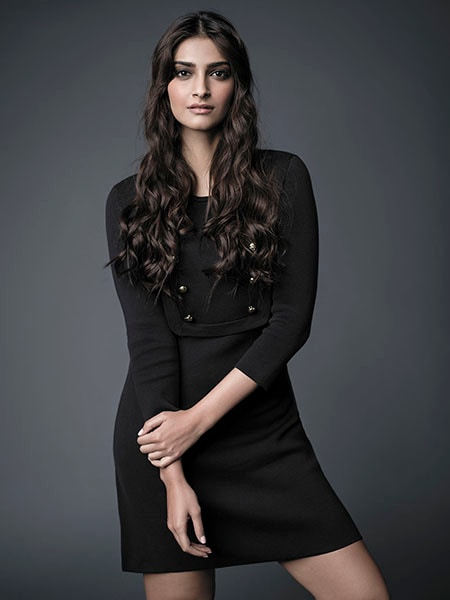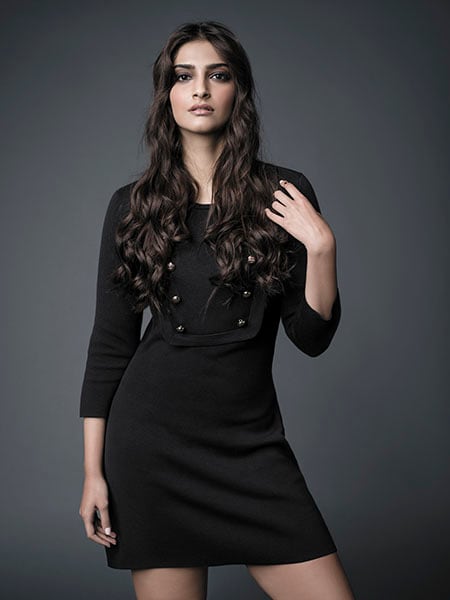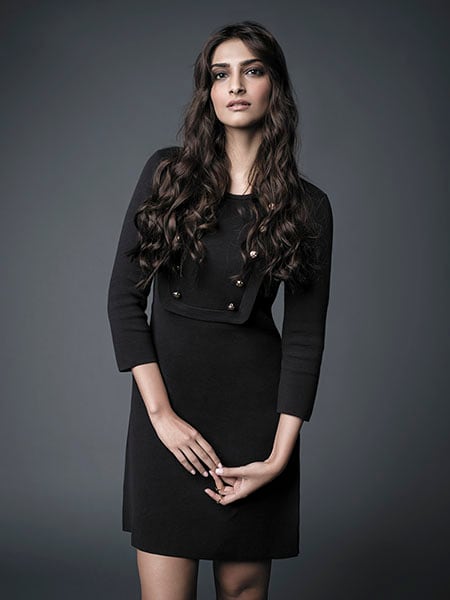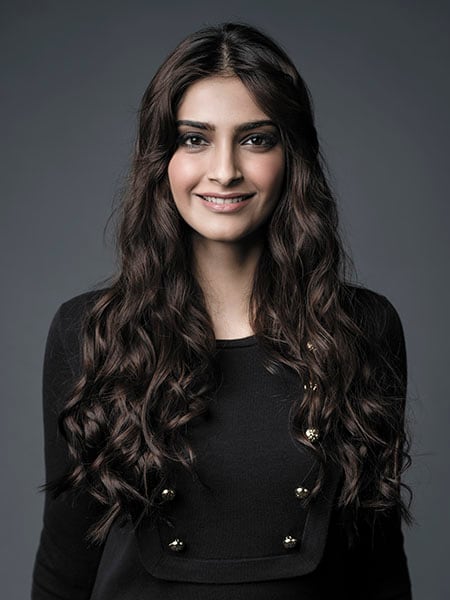Rebel with a cause: Sonam Kapoor's diverse repertoire
Sonam Kapoor is playing Bollywood on her own terms. And she's doing it well—really well


Forbes India Celebrity 100 Rank No. 18
Styling By: Nitasha Gaurav Make-Up: Divya Chhablani Hair: Alpa Khimani Dress: Salvatore Ferragamo Shoes: Fendi
Image: Abhay singh
Dressed in grey track pants, a matching sweatshirt and a purple top, Sonam Kapoor flops down on the couch, her hair tied loosely in a bun. She looks nothing like the fashionista for which she’s earned a name for herself in Bollywood, but if you want to put a face to a recent Buzzfeed post titled ‘I Didn’t Wake Up Like This’, which rips apart conventional notions of beauty, this could be it. It’s no mere coincidence, for, the author of the viral post with the self-explanatory title is the 31-year-old Bollywood actor herself. And she continues to hammer home her derision for skin-deep stereotypes by saying, “I have never consciously thought of style. I just wear what’s comfortable. And I am most comfortable in my pyjamas.”
In a way, Sonam’s penchant for making non-conformist, offbeat choices off screen is symptomatic of those she has made on it. She might have acted in over 14 films and three music videos—Coldplay’s ‘Hymn For The Weekend’ alongside Beyonce among them—but her nearly-decade-long stint in the film industry can’t be plotted to a pattern. Her repertoire isn’t voluminous, but is varied and on her own terms: It includes the wildly successful, over-the-top Prem Ratan Dhan Payo (2016) to the muted Neerja (2016) and the comic drama, Khoobsurat (2014). And Sonam is adamant that she wants to keep it that way. Which is why she is willing to sit out a year and wait for the right movie instead of doing something “with two songs and three scenes” merely to add volume to her body of work. “I live in this beautiful house [her three-storeyed parental bungalow in Juhu], I don’t have to pay my bills, and I have more luxury of choice than a regular girl joining this industry. So it is more of a responsibility for me to make these unconventional choices,” says Sonam.
If you look at her career graph, her game plan’s paying off. This year, she has two hits to her credit—Sooraj Barjatya’s Prem Ratan Dhan Payo and Ram Madhvani’s Neerja. Alongside, she endorses brands like L’Oreal, Oppo, Snickers, Cera, Kalyan Jewellers and Colgate. Not surprisingly, she has moved eight places on the 2016 Forbes India Celebrity 100 List, to 18 from 26 last year.  <<The going has been particularly good since Raanjhanaa (2013), where she starred alongside Abhay Deol and Dhanush. The movie opened a floodgate of hits for Sonam with Khoobsurat, Dolly ki Doli (2015) and Prem Ratan Dhan Payo, and capped it with the incredible success of Neerja, the real story of slain Pan Am flight attendant Neerja Bhanot. Says Sonam, “After Neerja, I was just irrefutable.”
<<The going has been particularly good since Raanjhanaa (2013), where she starred alongside Abhay Deol and Dhanush. The movie opened a floodgate of hits for Sonam with Khoobsurat, Dolly ki Doli (2015) and Prem Ratan Dhan Payo, and capped it with the incredible success of Neerja, the real story of slain Pan Am flight attendant Neerja Bhanot. Says Sonam, “After Neerja, I was just irrefutable.”
The movie has already fetched Sonam a few awards, but trophies don’t really count much for her. “It’s nice when you get awards. But awards don’t define your stardom,” she says. What gives Sonam greater satisfaction is that, with her list of hits, the conversation has moved from her role as a style icon to her acting skills.
It’s perhaps only natural that accolades don’t mean much to the actor who didn’t set out to be one. “My foray into Bollywood had nothing to do with being an actor. It had everything to do with telling amazing stories,” she says. “I just happened to become an actor by chance.”
***
The happy accident of Sonam the storyteller turning into Sonam the actor took place after she returned home in 2003, after completing her two-year course in theatre and arts at the United World College in Singapore. At that time, filmmaker Sanjay Leela Bhansali was working on Black (2005) that starred actors Amitabh Bachchan and Rani Mukerji. “I liked Bhansali’s aesthetic. He was technically sound and I thought why not assist somebody who is a fantastic editor and knows his shots. Because, at the end of the day, it’s not about the kind of films he makes, it’s about how he makes them,” says Sonam. The stint ended up with her being cast as the lead opposite debutant Ranbir Kapoor in Bhansali’s next, Saawariya (2007). She hasn’t looked back since.
Father Anil Kapoor says Sonam’s career decisions have been largely impulsive. “She goes with her gut both in her choice of films and co-stars. All she needs is a good script.” With Neerja, for instance, Sonam knew it was a great film, but never expected it to be a hit commercially. “It’s a woman-centric film about an air hostess, she doesn’t get out of the plane, and there is nothing happy about this film. The girl dies in the end. I didn’t expect it to be the biggest success of the year,” she says.
But Neerja turned out to be a film that could define Sonam’s career and legacy in the industry. It’s one of those films, Anil Kapoor says, that is enough to prove your mettle “even if you get only one such film in your career”. She carried the movie on her shoulders, depicting with empathy the last few days of Neerja Bhanot who died saving passengers caught in a hijack.Neerja’s producer and fashion photographer Atul Kasbekar says Sonam was their first and only choice because of her clarity of thought, which would reflect well in her performance. “Sonam’s acting is more inward and a lot more controlled and international. When you watch a foreign movie, the actors don’t look like they are acting. They look like the character [that they are playing]. That’s exactly what Sonam does,” he says.
Kasbekar’s association with Sonam goes back a long way before Neerja, when he did the first ever fashion shoot for the actor. “I remember meeting this lovely tall girl at a party, and I didn’t know she was Anil Kapoor’s daughter. I told her you should model,” he says. “As a photographer, I can tell you that Sonam is at an international supermodel level and extremely versatile. She can give many angles and understands how the camera works for her and how she works for the camera.”
But Sonam doesn’t take her love affair with the camera for granted. She knows that even star kids don’t have it easy if they are not good enough. “It’s an industry, a business. Nobody is going to invest in you if you don’t have something,” she says. While she doesn’t track box office numbers—“I understand numbers, just don’t track them because it’s not my business”—she is more than willing to go the extra mile to get into the skin of her character. Like, doing workshops. For Raanjhanaa, for instance, she went to Delhi and studied how to be a street play artist at Jawaharlal Nehru University (JNU) for Khoobsurat, she worked with a sports scientist, and for Neerja, she went to the Jet Airways office and learnt the art of being an air hostess. “I can become an air hostess anytime now,” she says with a laugh.
Once the homework is done, Sonam surrenders herself to the director and embraces his process. For Ram Madhvani, the director of Neerja, the ‘process’ meant shooting with four cameras at any given point in time and seeing “how a character can exist before action and after cut and not just during and in-between”. Sonam, he says, understood the process immediately and instinctively. One of her best enacted scenes, Madhvani says, is when she tells the hijackers “Main sirf apna farz nibha rahi hoon” even as they try to stop her from serving the passengers. “In a game of tennis, you know your strokes. But how you play them depends upon how the opponent delivers the ball at you. Similarly, in acting, your line is your stroke. It’s scripted. But how you say it is entirely dependent on you. Sonam played the stroke very well,” he says.
Veteran actor Shabana Azmi, who played the role of Sonam’s mother in Neerja, concurs. “Sonam was completely committed to the part and worked on a gruelling schedule like a trouper. No starry airs. Ram is a demanding director in a gentle way and she trusted him enough to surrender to his vision,” says Azmi, who has been friends with her parents Anil and Sunita for over 30 years and has seen Sonam grow from a “chubby little girl into the fine young woman she is today”. “There are two scenes I particularly like her in. When she eats the chocolate after reading her boyfriend’s letter and where she sings ‘Mere Sapnon Ki Rani’ at gunpoint. Both could have fallen flat, but instead they worked beautifully.”
***
A recurring theme in many of Sonam’s films has been the presence of a strong female character, a trait that she identifies with. Brought up in a household that encourages individualism, she has essayed the hard-hitting Neerja or the playful Bittoo Sharma (of Delhi-6) with equal ease. “When I was narrated Prem Ratan Dhan Payo, the first scene of Maithili was that of her sitting at a dining table with Yuvraj Vijay Singh (Salman Khan) and saying ‘I don’t have to marry you. I’m very happy with my life. We can end this’. The whole idea of the film is that he is convincing her that he is worthy of her. Or Mili in Khoobsurat was like ‘I don’t have to change who I am to get my prince charming’,” says Sonam. “Each character is unique but what ties them together is that they are strong individuals.”
Her propensity for non-conformism can be traced back to the Kapoor household that, as Anil Kapoor says, has five friends living together. “There is a certain line which they cannot cross, but overall our approach is each to his own.” While the kids were growing up, Anil and wife Sunita explained to them the numerous life diversities and allowed them to make their own choices. For example, Sunita is a vegetarian, Sonam is a vegan, while Rhea is non-vegetarian. Similarly, Sonam is a believer, Rhea an atheist, and brother Harshvardhan agnostic.
Being vocal can backfire at times, or be misconstrued, like it did when Sonam had a public spat with Shobhaa De at the beginning of her career. De had blogged that Sonam “just doesn't cut it in the sex appeal stakes”, and Sonam, in turn, responded by calling her “a 60-something porn writer”. Or, more recently, during her interview to actor Neha Dhupia on a music streaming app, where she took a dig at some of her Bollywood colleagues. “I was very upset and so was she. She was completely misquoted in every way, just because she has an image of being honest,” says Anil. But Sonam has a more cavalier attitude towards such controversies. “I’ll say what I want to say anyway, but will always apologise if I have said something wrong,” she says.
Like she will continue to tell Bollywood off for being coy about exploring homosexuality. Or the yawning pay disparity that thrives in the industry. “It is disrespectful. I make sure it doesn’t happen to me,” she says. And she ensures that she keeps the conversation going, with herself, with her co-stars and even her fans, for which she has launched her personal app, the first for any Indian celebrity.But, despite her outspokenness and keenness to reach out, Sonam is guarded when it comes to her private life. “I don’t like to be spotted. There is a reason why it is called private and personal. It takes away from the sanctity of a relationship. It takes away from things, especially if you really love somebody,” she says.
When she is not shooting, she loves to lock herself up in her room and read books or watch shows. Says Anil, “Sonam is a lot like my wife. When I was dating Sunita, she would go to the library and get 15-20 books at one time. Similarly, Sonam is capable of finishing two books in one night.”
She also loves music. Ayushmann Khurrana, her co-actor in the 2014 movie Bewakoofiyaan, remembers the time he and Sonam went to a Norah Jones concert after a long day’s shoot in Delhi. “I slept through the concert because I was sleepy and hungry at the same time. To date, Sonam makes fun of that. Sonam knows her music. From Indian retro to contemporary international music, she follows everything.” Her appetite for life is significant. As Madhvani puts it: “Sonam is a voracious reader, voracious watcher of movies, a voracious listener of music, a voracious talker and, guess what, a voracious eater too. One way to make Sonam happy is to give her chakli.”
As she enters her tenth year in the industry in 2017, Sonam seems to be in a happy space. Her upcoming project is Veere Di Wedding and she will likely play Madhuri Dixit in a biopic on Sanjay Dutt’s life with Ranbir Kapoor in the lead role. While these would add to her portfolio, her father believes she still has a long way to go to fulfil her potential. Sonam, though, is ready for the journey, even if it’s a rollercoaster. And she reminds you before signing off. “I didn’t become an actor to become the biggest superstar in the country. I just hope to continue to tell stories.”
First Published: Jan 02, 2017, 06:22
Subscribe Now

